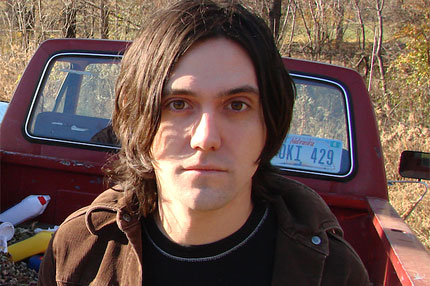Very, very few artists have earned the distinguished honor of being tipped as the “Next Bob Dylan” or “Their Generation’s Bob Dylan,” but Omaha singer/songwriter Conor Oberst is one of ’em.
Oberst, now 30, began writing, recording, and releasing albums in 1993, at age 13. With his fast-talking delivery and poetic lyrics that vary from personal introspection to religious mediation, from attacks on social structure to politics, he became an indie rock icon, releasing thousands of songs, mostly via Saddle Creek, the label he co-founded. And, like Dylan, he’s restless, switching musical styles with almost every release.
Oberst, a fiercely outspoken political activist, who has recently supported President Obama and fought the immigration laws in Arizona, chatted with SPIN about his new album as Bright Eyes, The People’s Key (out Feb. 15), what’s on his mind about America these days, and American Idol.
Have you finished your Christmas shopping yet?
No, I haven’t. I’m such a procrastinator. I’m going to California to have Christmas dinner with Jenny Lewis and Johnathan Rice because my family is all scattered right now. Maybe I’ll buy them some cassettes for their vintage station wagon, or an air freshener.
Or a DVD! I imagine you watch a lot of those on the road, no?
I definitely love Lost. I discovered it just last year and watched the box set. It’s so addictive. I’m big fan of Netflix these days. I watch all my favorite Woody Allen films. But, you know, when I’m not on the road I’m been spending a lot of time camping, actually.
Really? You don’t seem like an outdoors type.
I’m not. Or at least I wasn’t until the few years ago. I never camped as a kid, but I really got into camping and sleeping outdoors. I’ve also done some amazing river floats in New Mexico and Idaho. It’s peaceful and awesome.
Yeah, until you’re attacked by a bear…
Actually, one time we stopped for lunch on a sand bar and started pulling out the food. All of a sudden, the most bees I’ve ever seen in my life came out of nowhere. It was a total swarm. Some people got stung and we had to scramble to get back in the boats.
Yikes. So, The People’s Key, the name of your new album, refers to the simplest key in which to play a song. But there’s some disagreement over which key is, in fact, the simplest.
Well, I’ve always considered it the key of C, which is all the white keys on the piano. That’s usually the easiest to play. But guitar players usually think of it as the key of E.
Over the past few years you’ve recorded under numerous titles, including your own name. But now, after a three-year break, you’re returning to Bright Eyes. What distinguishes it?
Well, to outsiders it probably seems like splitting hairs, but to me, Bright Eyes is a simply the collaboration between myself and Mike Mogis and Nate Walcott. What you hear is definitely the sum of all our ideas and represents all three of us. But I still write the songs myself. I’ll usually send them demos, then we’ll get together and decide how to approach the song and how to arrange it.
Your past few releases, even with your super-group side-project Monsters of Folk, have been Americana-tinged. But you’re going in another direction with this album.
I’m proud that with Bright Eyes we’ve always experimented and tried to make a different record every time out. I’m feeling burnt out on the Americana, roots-y sound. I just wanted to make something different, something modern but something that still had warmth.
What about lyrically?
Well, the songs all definitely have a meaning to me, but I long ago realized it’s better to let people find their own meaning.
Why? You don’t want to spoil the process of discovery?
I wouldn’t say spoil. But so much of listening to lyrically driven music is projecting your own feelings and experiences into the music. I wouldn’t want to keep someone from finding something for themselves.
On Billboard’s list of the biggest selling artists of 2010, there’s a glaring absence of rock musicians.
We’re on a pop wave again. But any genre of music can be done really well, or it can be done not so well. I prefer career artists that have spent time honing their craft, as opposed to, “I won a karaoke contest on a reality show and now I have a record.” That’s such a drag. The music that comes out of it is so poor. The celebrity element is not interesting… at all.
You’re referring to American Idol…
Yeah. I just don’t get it. It’s not really interesting. And it’s even less interesting when they continue to record bad music and sell it. But anyone who is serious about making their music and working at it, I think that’s fantastic whether I relate to the genre or not.
What about protest songs? You’re a very political person and songwriter, from fighting the Arizona immigration laws to supporting President Obama. Do you feel music is still a relevant form of political protest?
Music is still a powerful force. It’s unique in the sense that it can go behind enemy lines and get into people’s homes, minds, stereos, and hearts. It’s often more than a political message or an argument for or against a certain position. To me, a political song is also a personal song. Most political activism has been driven by empathy for other people and the desire for a world that’s less divisive. Even if songs aren’t overtly political, they can make a listener more empathetic. They can open somebody’s mind to a different experience. They can help you feel less alone. They can remind you that we’re all the same, which we are.
As a strong supporter of President Obama, who performed at his primaries, what do you think two years into his term?
I’d be lying if I didn’t admit disappointment. There are campaign promises that weren’t kept, which is a big disappointment to me. I thought he was going to deliver something more progressive than just, you know, the same ol’ thing. But I don’t pretend to know the situation. I think he’s well intentioned. It’s difficult to break out of that system.
What system?
It’s all about the power structure of money and corporate America. It’s class warfare.There’s a small amount of super-wealthy people that want to maintain their billions and billions of dollars. Those are the people who are really making the decisions. America’s middle class is shrinking; poverty is used as a weapon to control people, and until we engage with that power structure, it doesn’t matter who we elect.
What’s up with the effort to fight the immigration laws in Arizona?
I recorded a tune, “Coyote Song,” which you can buy from the Sound Strike site, and the money goes directly to the Florence Project, a group in Arizona that provides free legal aid to the immigrants imprisoned in those big, for-profit detention centers. Those are really scary. There’s no incentive to let people out. Every day a prisoner is there, the powers that be make money. It seems just insane. Some of these kids ride trains all the way up from South America and then when they finally get to the States, they’re just thrown into this black hole of a detention center. No one knows where many of them came from or how to contact their families. It’s a mess.
You’ll tour the U.S. this spring. Will you be boycotting Arizona?
Yes. Don’t get me wrong — I do love Arizona. But the only way to put pressure on the state government is through an economic approach. It’s important because it encourages fans to react to their government and hopefully push for concrete changes. This isn’t just an isolated thing; it’s growing. Copycat laws are starting to appear in other states. If we don’t get together and say this is completely unacceptable, then we could see this other places. One of the biggest industries in Arizona is the convention center industry. They’ve lost hundreds of millions of dollars in canceled conventions this year because of the boycott. So, there’s some good news: it’s working.
More Conor Oberst on SPIN.com:
SNEAK PEEK: First Bright Eyes Song >>
Conor Oberst Protests Arizona Law with New Song >>
Q&A: Monsters of Folk from SPIN’s October 2009 Issue >>





